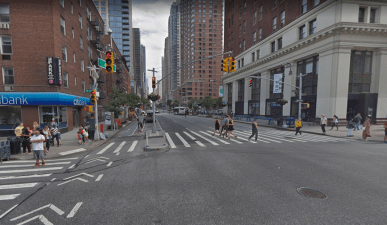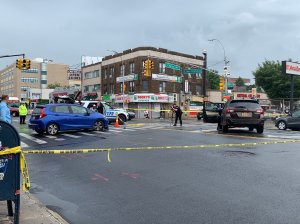Medical Examiner: Pedestrian Hit By Cyclist Died From ‘Complications’

The city’s medical examiner has finally ruled on the death of the pedestrian who police say was killed by a hit-and-run cyclist over the summer — telling Streetsblog that the pedestrian died as a result of “complications” from hitting his head.
Police had said that 60-year-old Michael Collopy was struck by the cyclist as he stood in the protected bike lane at Sixth Avenue and 23rd Street on July 31 — and had definitively stated that collision with the cyclist caused Collopy’s death on Aug. 5. That declaration stirred up controversy that cyclists are “out of control” in the city, while cycling advocates complained about cops’ repeated attempts to slander them.
The medical examiner initially repudiated law enforcement’s claim, saying that no official determination had been made — but now, three months later, the medical examiner on Monday deemed Collopy’s death an “accident” from “complications of blunt impact injuries of head.”
“Complications” means that Collopy died later in the hospital while being treated for his injuries, but does not “indicate fault on the part of anyone who treated” him, according to a spokeswoman for the medical examiner.
The deaths of most victims of traffic violence are similarly deemed “accidents” unless they were purposefully killed, like 47-year-old Donald Robert, who was run over by 41-year-old Korey Johnson because Johnson suspected Robert of breaking into his car. In that case, the death was ruled a “homicide.”
In Collopy’s case, police were right about one thing: the pedestrian did die after falling on busy Sixth Avenue in the middle of the day, a fall the cops attributed to Collopy being struck by a hit-and-run cyclist. But without witness statements or video to show exactly what happened, it’s unclear if Collopy fell as a result of being hit by the biker or merely fell on his own, causing the head trauma that led to his death.
And the NYPD has not produced any video of the alleged crash, nor provided any information about its supposed search for the hit-and-run cyclist. For now, cops are merely saying that the “investigation remains ongoing.”
Regardless of how exactly he was killed, Collopy’s death should be a lesson for every road user — especially those in 2,000-pound-plus cars — to be cautious of others around them, said a spokesman for Transportation Alternatives.
“Each death on our streets, regardless of what type of vehicle is involved, is one too many,” said Joe Cutrufo. “We all have a responsibility to each other, regardless of how we travel, but reasonable people can agree that the responsibility that comes with riding a bicycle can’t be compared with the responsibility that comes with piloting a multi-ton motorized vehicle.”
Since 2012, the first full year when the Department of Transportation was required to collect such data, seven New York City pedestrians have been struck and killed by cyclists, compared to more than 1,000 killed by drivers over the same period. On average, the pedestrian annual death toll by cyclists is less than one, but roughly 138 pedestrians are killed in the average year by cars in New York City. And this year, at least 26 cyclists have been killed.
Meanwhile, 22 percent of red light tickets written by the NYPD are handed out to cyclists.



